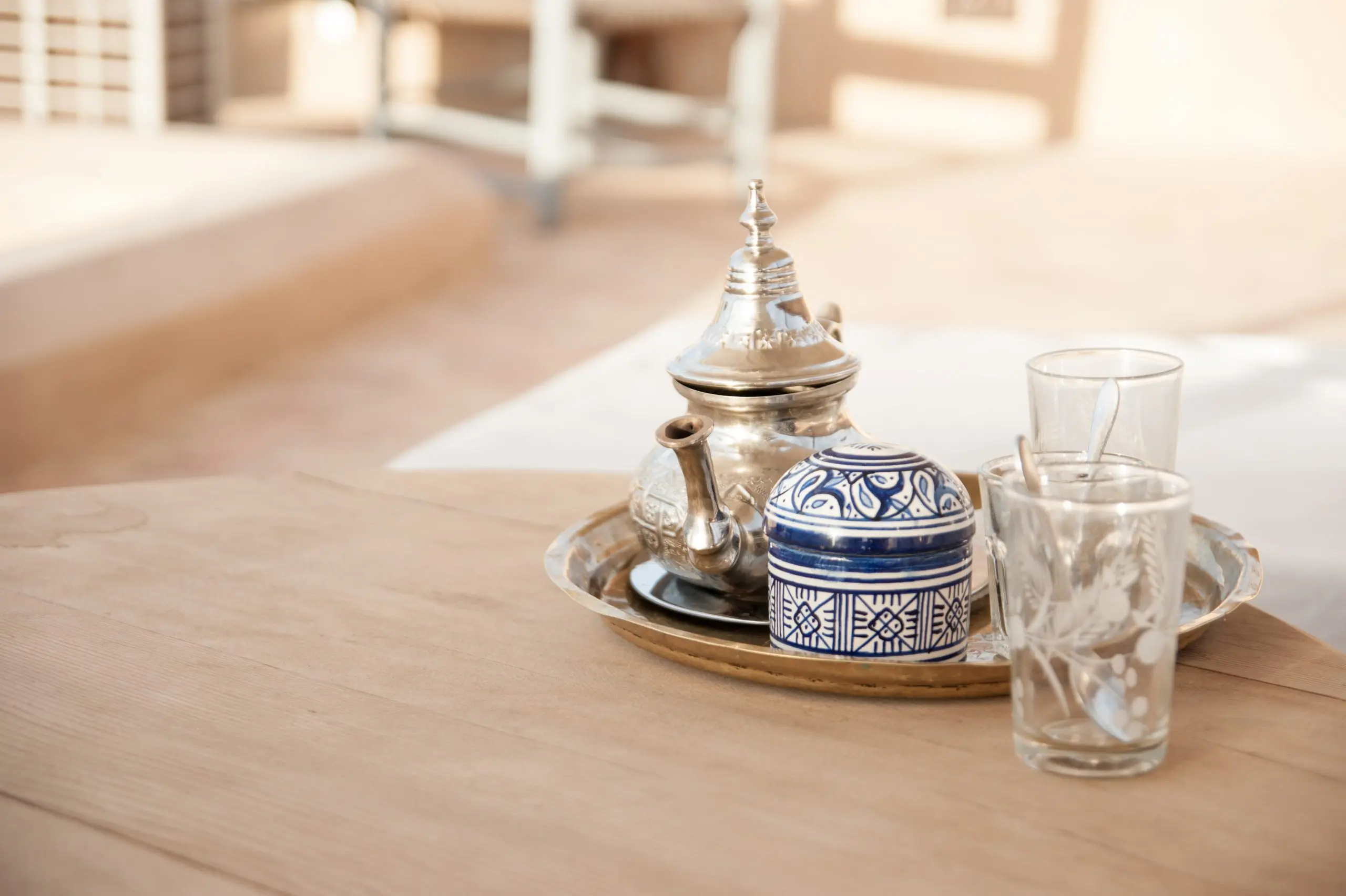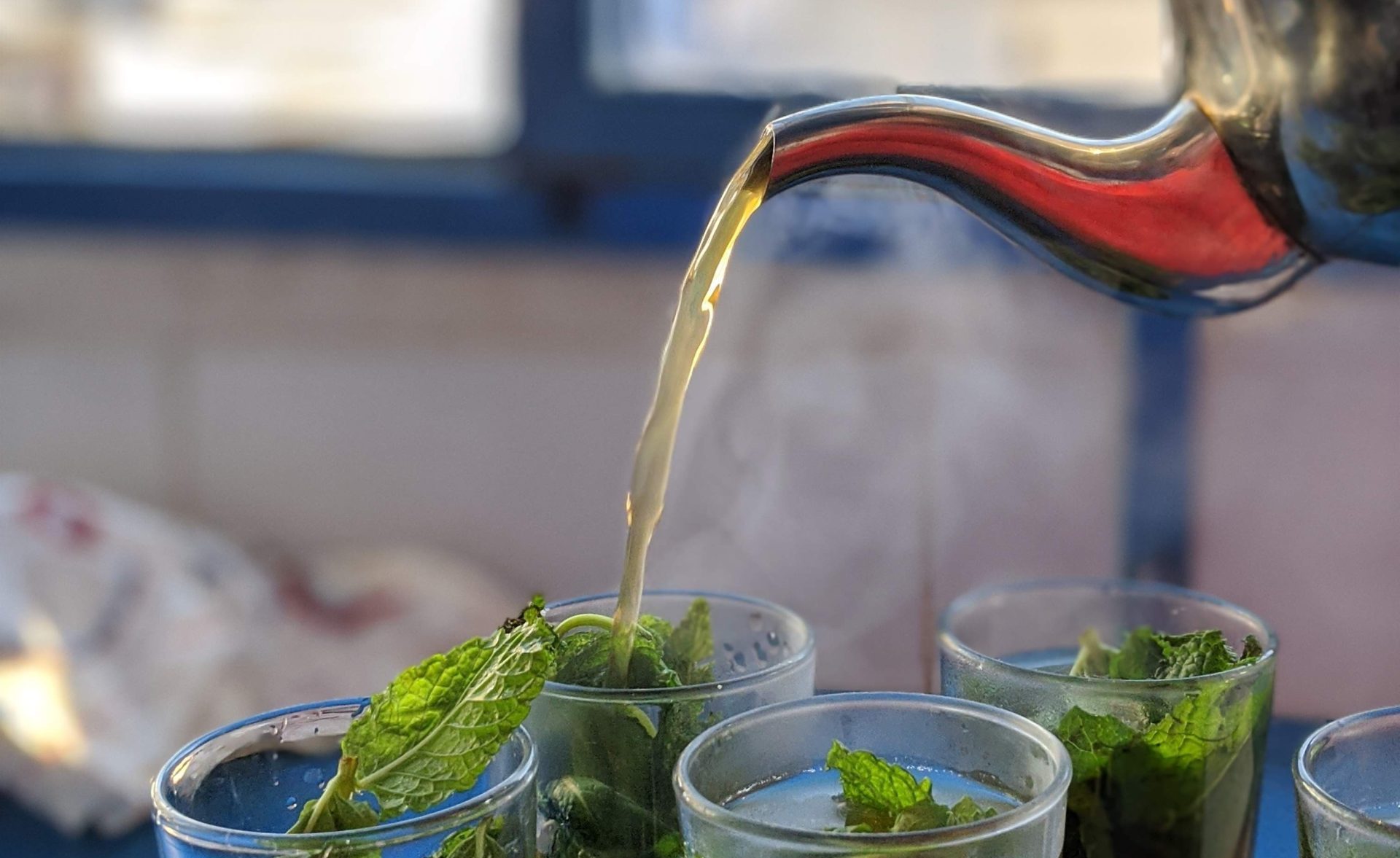Picture yourself seated on a vibrant Moroccan terrace, a glass of freshly brewed mint tea cradled in your hands, and the sweet aroma of spearmint filling the air. Welcome to the world of Moroccan mint tea, where tradition and flavor intertwine in a dance that’s more than just a beverage.
I still remember the first time I sipped Moroccan mint tea. The combination of fresh mint leaves, strong green tea, and just the right amount of sugar created a symphony of flavors that danced on my taste buds. It wasn’t just a beverage; it was a Moroccan tradition, a symbol of hospitality and connection. In this personal blog, I’ll take you on a journey to taste Moroccan mint tea like a local, delving into the heart of Morocco’s rich tea culture and cuisine.
If you wish to experience Moroccan mint tea like a local, these fantastic Morocco tours are just for you!

The Ritual of Moroccan Mint Tea
Tea as a Welcoming Gesture: Moroccan mint tea, known as “atay,” isn’t just about quenching your thirst; it’s about the art of hospitality. The moment you step into a Moroccan home or café, you’re likely to be greeted with a steaming glass of mint tea. It’s a warm welcome, a sign of respect, and an invitation to share stories.
Ingredients that Matter: The beauty of Moroccan mint tea lies in the simplicity of its ingredients. Green tea leaves, fresh mint, sugar, and water come together to create a harmonious blend. The green tea is often Chinese Gunpowder tea, known for its robust flavor, while spearmint is the preferred mint variety.
The Art of Pouring: Moroccan mint tea is traditionally poured from a height, allowing it to froth at the top. This adds an element of showmanship to the tea preparation and enhances the overall experience.

The Moroccan Mint Tea Experience
Tea Time is Anytime: Moroccan mint tea isn’t confined to a specific time of day; it’s an all-day affair. You can enjoy it in the morning, during a midday break, or after a hearty meal. Whenever you sit down for a chat or relaxation, a glass of mint tea is likely to accompany you.
Pairing with Delicacies: Moroccan mint tea beautifully complements the country’s diverse cuisine. It’s often enjoyed with sweet pastries, such as “kaab el ghazal” (gazelle horns) or “chebakia,” during festive occasions and celebrations.
Tea with a Twist: While the classic Moroccan mint tea is the most beloved, you’ll also find variations with additional flavors like orange blossom water or pine nuts. These variations add an intriguing layer to the tea experience.

The Essence of Moroccan Culture
Connection and Conversation: Moroccan mint tea transcends being just a beverage; it’s a vehicle for connection. It’s an invitation to sit, talk, and linger. In a world that moves at a frenetic pace, the Moroccan mint tea ritual is a reminder to pause and savor the moment.
Symbol of Morocco: Moroccan mint tea is not just a drink; it’s a symbol of Morocco itself. The care and attention put into preparing and serving the tea reflect the warmth and generosity of the Moroccan people.
Tea with a View: Imagine sipping Moroccan mint tea on a rooftop terrace in Marrakech, with the sounds of the bustling souks below and the Atlas Mountains on the horizon. It’s a sensory experience that defines Morocco’s enchanting charm.
Tasting Moroccan mint tea like a local is not just about the tea; it’s about embracing the culture and traditions of Morocco. It’s a lesson in the art of taking your time, of cherishing moments, and of sharing stories. So, the next time you find yourself in Morocco, don’t just order mint tea; immerse yourself in the ritual, savor the flavors, and allow it to weave itself into the beautiful tapestry of your Moroccan experience.
So, as you savor that last sip of Moroccan mint tea, remember that this timeless tradition isn’t just a delightful drink. Cheers to experiencing Morocco one refreshing cup at a time!
 Summer Sale: 45% Off
Summer Sale: 45% Off Croatia Sailing : 45% Off
Croatia Sailing : 45% Off Greece Trips : Save 45%
Greece Trips : Save 45%  Central & Eastern Europe Tours: 45% Off
Central & Eastern Europe Tours: 45% Off  Why Travel Talk
Why Travel Talk Travel Talk Blog
Travel Talk Blog Responsible Travel
Responsible Travel Fair Travels with Travel Talk
Fair Travels with Travel Talk